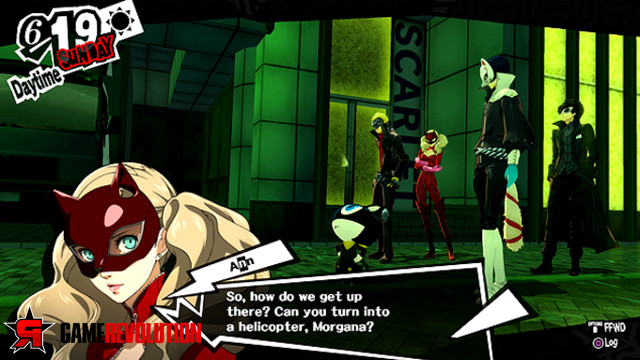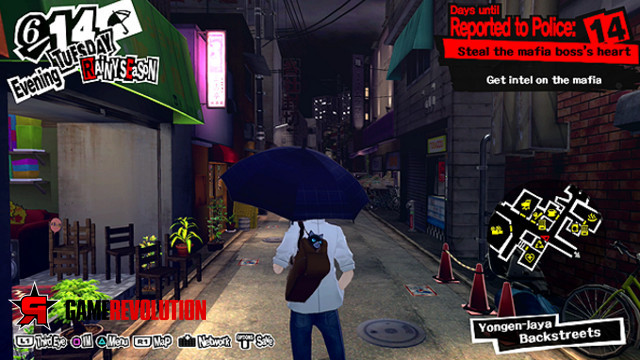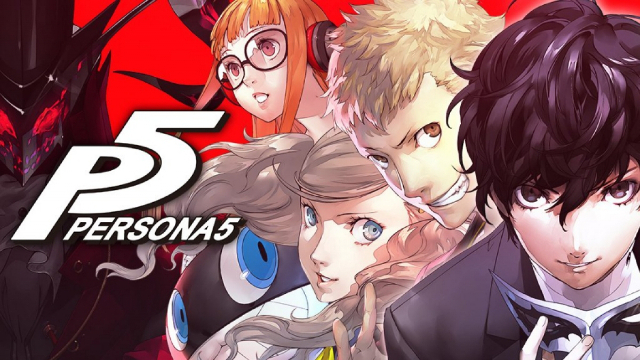↵As Persona 5 is nearing its release date, I’ve been reflecting on my personal journey with the series. It’s not common for me to spend forty hours playing a single video game in the span of a week, but that’s exactly what happened when Persona 4 first came out eight years ago. Prior to that, I didn't have any knowledge regarding the Shin Megami Tensei franchise even though I was searching for a JRPG to grasp my attention. Time has considerably elapsed since my initial discovery of the series, but I still adore it as much as ever.
Over the years I’ve come to admire the social aesthetic that’s heavily emphasized in the Persona titles, as it contrasts against other RPGs that emphasize cutscene and combat loops. Looking back, I would’ve never predicted the impact Persona would have on the West, as the intended target audience for these games is probably better served overseas. Fortunately, this did not hinder the growth of the series and with Persona 5 on the horizon, we’re seeing more exposure than ever before.
Despite having an overall darker narrative, Persona 5 is miles ahead of its predecessors. Let's go over why this game is something to remember.
The King of Hearts
After being placed on probation for assault, your parents force you to start a new life away from home. Upon arriving in Tokyo as a transfer student, you immediately travel to the Yongen-Jaya district in order to greet your new caretaker and learn more about the school you’ll be attending. There, you meet a stern coffee shop owner who constantly reminds you to behave yourself while residing in his attic. You end up having a difficult time adapting to these changes, as the unfamiliar faces surrounding you share a mutual feeling of resentment due to your complicated past.
During this period of time, you awaken your Persona and learn about the Palace—a distorted reality representing the mind of an adult with ill intentions. You eventually stumble into other students who also unlock their Personas and a group called the Phantom Thieves of Heart is formed together. With a shared goal of cleansing the hearts of corrupted individuals, the Phantom Thieves set out to find a target worthy of change.
The story feels slow to start and you’ll face plenty of tutorials during the first ten hours. Despite this, I’ve come to admire both the pacing and setting in Persona 5, as the expanded city environment left room for story events to transpire in a variety of locations, keeping things fresh. As a new student, I was continuously making friends at Shujin Academy despite the negative rumors. There’s Ryuji Sakamoto, a cheery blonde-haired teenager who once ran track. Morgana is an amnesiac talking cat that looks innocent at first glance. And then there's Ann Takamaki, a quiet girl who is both loved and hated for her attractive looks. You and your friends share a common bond between the group that stems from the personal struggles of everyday life.
More Reading: Everything You Need To Know About Persona 5
Every single conversation in Persona 5 creates a feeling of attachment to the characters as you listen to their tonality shift based on the circumstances. I’m pleased with the amount of dialog voiced and translated by Atlus USA, and can admit I remained skeptical with the way it would turn out up until Persona 5 was finally in my hands.
Speaking of audio, the entire soundtrack in Persona 5 is made of some of the catchiest tunes you’ll come across in a video game. There are moments where you’ll find yourself taking in the rainy atmosphere as a mellow jazz tune hums in the background, only to contrast against a mixture of energetic rock n’ roll instrumentals played during heated battles. The genius composer known as Shoji Meguro never failed to disappoint me no matter the mood of the game environment. Adding on to this, the presentation of the game has been nothing but snazzy and proves that Atlus brought its 'A game' this time around. Each part of the UI has been crafted with elegance in mind, and the rebellious character artwork dynamically flows together as you’re browsing through the various menu screens.
Yet, these details only play a small role in the fictional world laid before your eyes. Persona balances daily student life by introducing the ability to explore the city and fight shadows in various dungeons throughout the game. Before you know it, you’ll be knee-deep in a dungeon with shadows swarming on your position. There might be a lot going on here, but Persona 5 does a phenomenal job at all of the above.
Into The Labyrinth

You may recall the dungeon crawling system in Persona 3 where you’d travel from floor to floor inside Tartarus, effectively housing all combat progression within a single location. This grew into multiple locations once Persona 4 released and each dungeon was randomly generated, but there was still room for growth. With Persona 5, Atlus have taken ten steps forward and included a unique set of dungeons that completely differ from one other. These dungeons, ranging from an intricate Art Museum to a futuristic Space Station, aren’t randomized in any shape or form, bringing a slightly linear approach to level design that is focused and polished.
These dungeons have much more depth than the ones from past Persona titles. There is the addition of puzzles and traps, which rely on you having to use the third-eye ability in order to view hidden obstacles and progress past the area. I’ve been hooked on solving complex puzzles ever since I purchased my first Zelda game, so these clever puzzle contraptions are a contributing factor to the satisfaction I've gotten from the game.
Aside from Palaces, Persona 5 incorporates a procedural network of dungeons called “Mementos”, which can be accessed upon receiving a request from one of your confidants via an online fan site dedicated to the Phantom Thieves. You can take on as many requests as you’d like at any given time, but keep in mind they’re not mandatory to complete the game. I personally enjoyed traversing across the Mementos as they offer the ability to receive special items and Personas that you can’t always obtain in the average dungeon.
Persona 5 also introduces the amusing jump mechanic and artful cover system, both of which provide room for intense moments that were previously not possible. The cover system works to introduce stealthy gameplay where the player must avoid triggering the alarm system by remaining unseen. I wouldn’t be too concerned with avoiding stealth if I were you, as the game encourages players to take cover behind corners and only attack shadows when they avert their line of sight. Luckily the shadows cannot detect you from a great distance, which makes sneaking past them a piece of cake.
I live for occasions where the Phantom Thieves find themselves vexed after a grueling conversation, such as during an attempt to barter with shadows. This is one of the only times you get to interact with shadows in a verbal conversation and view the underlying humor behind each Persona. Although there is laughter at first, I usually end up feeling pity for some of the shadows once they portray their rough upbringing, realizing they share more in common with humans than one would imagine. After successfully dealing with a shadow, you will be able to either command it as a Persona during battle, receive a large amount of money or receive a random item.
Fighting For Your Future

Combat plays a big role in the series and Persona 5 boldly refines it for the greater good. You can now purchase a fictional handgun and shoot at shadows to weaken them. If you have the right amount of cash, your weapons can be upgraded at a shady back-alley shop. The elemental weaknesses from previous games carry over, so I didn’t really find myself exhausted during or after a battle despite the moderate presence of strategy. I’ve previously talked about the flashy menu boxes, but wait until you feast your eyes on the all-out-attack animation, or the finishing move performed by each party member. Not only does Morgana make a great companion, but he also looks exceptionally badass while puffing a cigar during his finisher. Talk about style.
Persona 5 retains the turn-based combat style, which I happen to favor over the real-time action combat displayed in JRPGs such as Final Fantasy XV and Ni No Kuni. In today’s era, most game developers are leaning towards creating an RPG without the classic turn-based style that originated decades ago. Somehow, Atlus have mastered the formula that was once a key element for Square Enix and similar publishers. In the midst of it all, the challenging demeanor presented by each Shin Megami Tensei game continues to exist, as most battles still require you to carefully strategize your moves. I’ve learned that finishing off an enemy as quickly as possible is the right way to play.
More Reading: 2017 Is The Year JRPGs Caught Up To Western RPGs
During a boss fight, you have the ability to send a single party member off to steal the boss’ treasure. This is, of course, a completely optional decision that can be made during the fight, depending on whether or not you’re comfortable with switching up the game plan. The velvet room beckons your return once again, as the myriad of Personas obtained during your early playthrough may not be powerful enough to take down a tough shadow. While gaining assistance from Igor and the Twins that reside in the velvet room, you’re able to combine up to three different Personas in order to create a single robust Persona that will hammer down on foes.
One of my goals was to create the sinister “Black Frost” Persona by the end of the in-game calendar, but it required having a level 2 “Jack-o’-Lantern” Persona; a level 12 “Jack Frost” Persona; and a level 61 “King Frost” Persona, before being able to conduct the advanced fusion. Occasionally, players may find themselves back-stepping through the dungeon floors in search of a unique Persona, which is similar to how I enjoy searching for my favorite Pokemon. The only downside is you have a limited amount of time to scout a dungeon before it’s gone forever.
Killing Time In The Big City

In Persona 5, there is never a dull moment between completing a dungeon and waiting for the next story-related event to take place. Upon observing the re-imagined Tokyo in Persona 5, you’ll come to realize it’s littered with numerous colorful markets, large parks, and restaurants where the protagonist and his associates can spend their time. For instance, you can head over to a small DVD rental shop called Scarlet and pick out a few television shows to watch back at the Le Blanc cafe. This is only one example of the dozens of side activities players can uncover.
Depending on the type of activity you decide to pursue, you can raise the protagonist's social stats such as knowledge, guts, charm and more. The higher your stats are, the further you can develop your social links. For those looking to raise their guts and advance a certain female confidant, nothing will hit the spot better than taking the nightly Big Bang Burger challenge. Don’t worry about failing the challenge, as you’ll still get a boost of Courage from it. You also have the option to purchase specific stat-increasing books and read them during your daily commute to school. It’s up to the player to decide which stats they want to build up.
When you’re not busy shopping for goods and eating heavenly delicacies, how about going on a date? The Persona games are well-known for imitating dating simulators and Persona 5 continues the trend. You can pursue a relationship with multiple characters by continuously hanging out with them and leveling their social link. To spice things up, you’re able to visit the Underground Mall and purchase gifts that can be given to your potential love interest. I’ve heard it’s possible to simultaneously have a relationship with every single girl you encounter, but I found this to be difficult during my first playthrough due to the decisions I made early on.
At the end of the day, Persona 5 gives players the freedom and opportunity to spend their free time however they deem fit. I’ve never felt so ecstatic about chasing after my favorite social activity at the center of all the chaos and action that takes place during the storyline. I think I’ve ultimately decided on the only game I plan on playing through Spring 2017.
Conclusion
More than eight years have gone by since I began waiting for a new Persona game. It wasn't easy, but there is no doubt in my mind that the wait helped create the best possible experience that fans could ask for. It’s rare to see a lesser-known JRPG series grab the wheel and bring new life into the genre, but that is exactly what Persona 5 has accomplished.
Persona 5 is the pinnacle of the JRPG genre, showcasing for one of the few times in history what it's like when a beautiful story is assisted by great gameplay. This is a game with a wonderful personality, and one with more content than just about any other single-player game you can name.
Persona 5 might have arrived with subtlety like a cool breeze, but its tailwinds will leave behind a confident and meaningful reminder that JRPGs are alive and well.
-
Biggest Persona game in history with a substantial amount of content
-
Sleek user interface design
-
Addictive dungeon combat with a variety of exploration
-
One of the best RPG soundtracks in video game history
-
Interactive puzzles designed to capture the player’s attention
-
Contains dual audio for hardcore fans
-
Slow pacing and dozens of tutorials during the first handful of hours
-
Certain character voices differ from their personality







